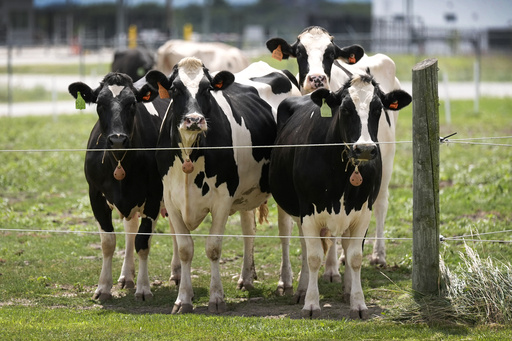
In Nevada, dairy cattle have been found to be infected with a new strain of bird flu, differing from the variety that has been affecting herds across the United States since last year, as reported by the Agriculture Department officials on Wednesday.
This discovery signifies that different forms of the H5N1 virus have made the leap from wild birds to cattle at least on two occasions. Experts express concern over the potential for further spread and the challenges in managing infections among animals as well as the individuals who work closely with them. Richard Webby, an influenza specialist at St. Jude Children’s Research Hospital, remarked on the unexpected frequency of such transmissions, stating that his previous assumption of it being a rare incident might not hold true anymore.
The H5N1 bird flu variant identified as B3.13 was confirmed in March after being transmitted to cattle at the end of 2023, affecting over 950 herds across 16 states. Meanwhile, the new variant, named D1.1, was detected in Nevada cattle on Friday, according to USDA officials. This new strain was identified through milk samples collected as part of a surveillance initiative that began in December.
Angela Rasmussen, a virus expert at the University of Saskatchewan, emphasized the importance of continuous testing to monitor these developments, highlighting the significance of the identification of the initial spillover. The D1.1 variant has been associated with the first reported U.S. death linked to avian influenza, as well as a severe case in Canada. In January, a Louisiana resident died after experiencing serious respiratory issues following contact with wild and backyard birds, while a young girl in British Columbia required extended hospitalization due to a virus traced to poultry.
According to the U.S. Centers for Disease Control and Prevention, at least 67 individuals have contracted bird flu in the United States, primarily those working closely with dairy or cattle.
USDA officials mentioned that they plan to upload genetic sequences and detailed information about this new virus variant to a public database later this week. Scientists believe this data will be crucial in determining if this spillover incident occurred recently or if the virus has been circulating undetected for an extended period.
Evolutionary biologist Michael Worobey from the University of Arizona, who has researched the H5N1 virus in cattle, noted the urgency of sharing information regarding any viruses that may pose a pandemic threat. He stressed that such viruses could potentially lead to situations far more severe than the COVID-19 pandemic. “It’s essential for national and global security and for the health of people, animals, and U.S. businesses,” Worobey concluded.

